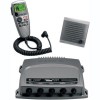Garmin VHF 300 Owner's Manual - Page 42
Channel Lists, Position Tracking, USA Channels - marine
 |
UPC - 753759094652
View all Garmin VHF 300 manuals
Add to My Manuals
Save this manual to your list of manuals |
Page 42 highlights
Appendix • Select SET to enter a new position. See page 26 for more information on manually entering position data. Position Tracking After five consecutive failed attempts to request position information from a vessel, "NO POS FOR [VESSEL NAME]" is displayed on the screen. • Select RETRY to reattempt the position request. • Select REMOVE to discontinue calling the vessel. When you take no action after three minutes, REMOVE is selected automatically. Channel Lists The USA, Canadian, and International channel lists provided in this Appendix are for reference only. It is the responsibility of the radio operator to ensure that channels are used correctly according to local regulations. USA Channels For the latest information on USA channels, visit www.navcen.uscg.gov/marcomms /vhf.htm. Also visit the Federal Communications Commission's Marine VHF Radio Channels page at http://wireless.fcc.gov/services/index.htm?job=service _bandplan&id=ship_stations. The FCC page does not include frequency information, but has more complete information on the use of the channels. IMPORTANT: Boaters primarily should use channels listed as non-commercial. Use Channel 16 to call other stations or for distress alerting. Use Channel 13 to contact a ship when there is danger of collision. All ships of length 20 m or greater are required to guard VHF Channel 13, in addition to VHF Channel 16, when operating within USA territorial waters. Users may be fined by the FCC for improper use of these channels. Channel Number 01A 03A 05A 6 07A 8 9 10 Transmission Receiving MHz MHz 156.050 156.050 156.150 156.250 156.150 156.250 156.300 156.350 156.400 156.450 156.500 156.300 156.350 156.400 156.450 156.500 User Port operations and commercial, VTS. Available only in the New Orleans and lower Mississippi areas. Government only Port operations or VTS in the Houston, New Orleans, and Seattle areas. Intership safety Commercial Commercial (Intership only) Boater Calling. Commercial and non-commercial. Commercial 36 VHF 300 Series Owner's Manual















